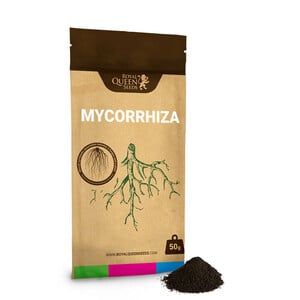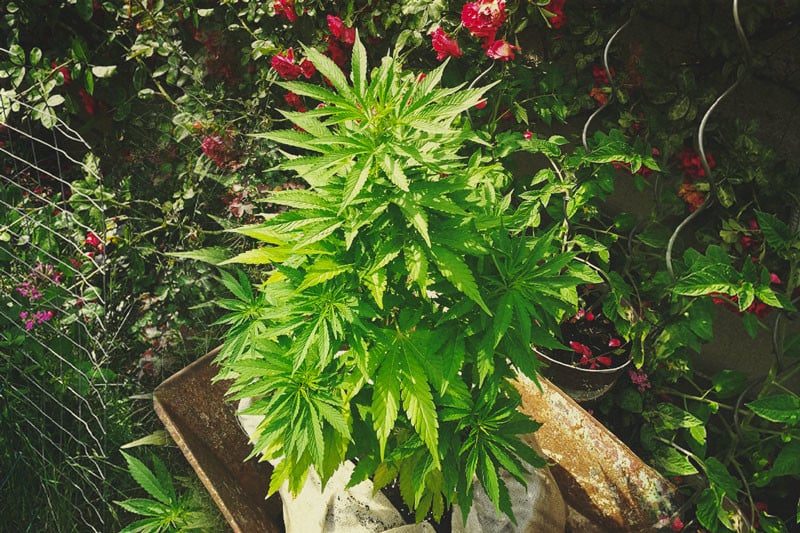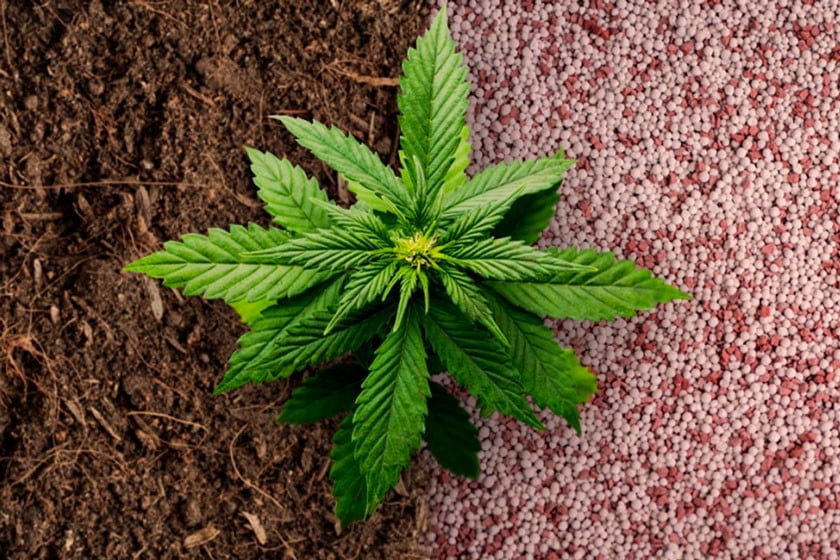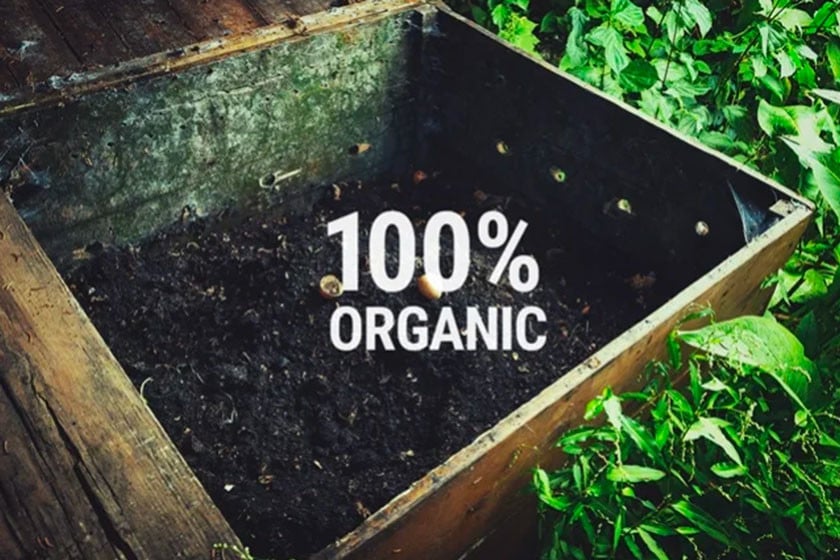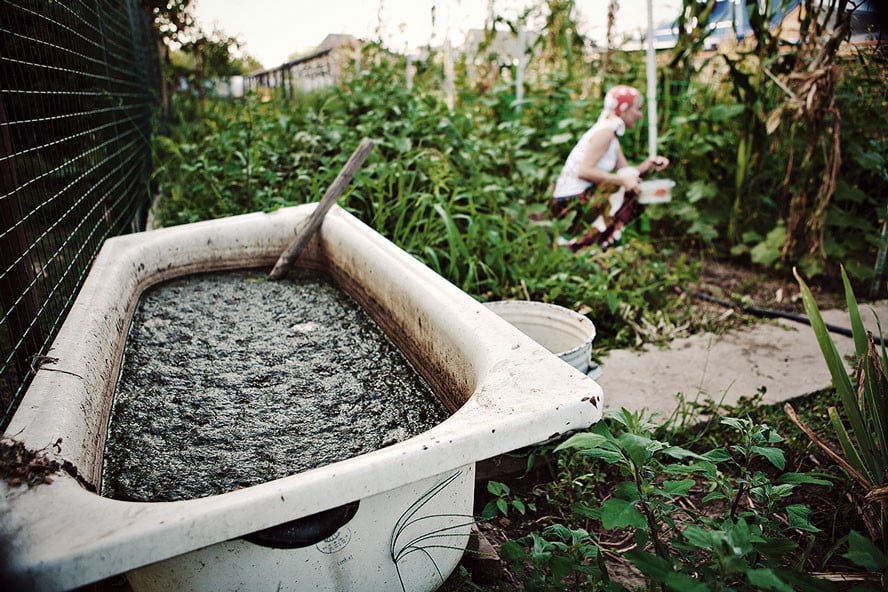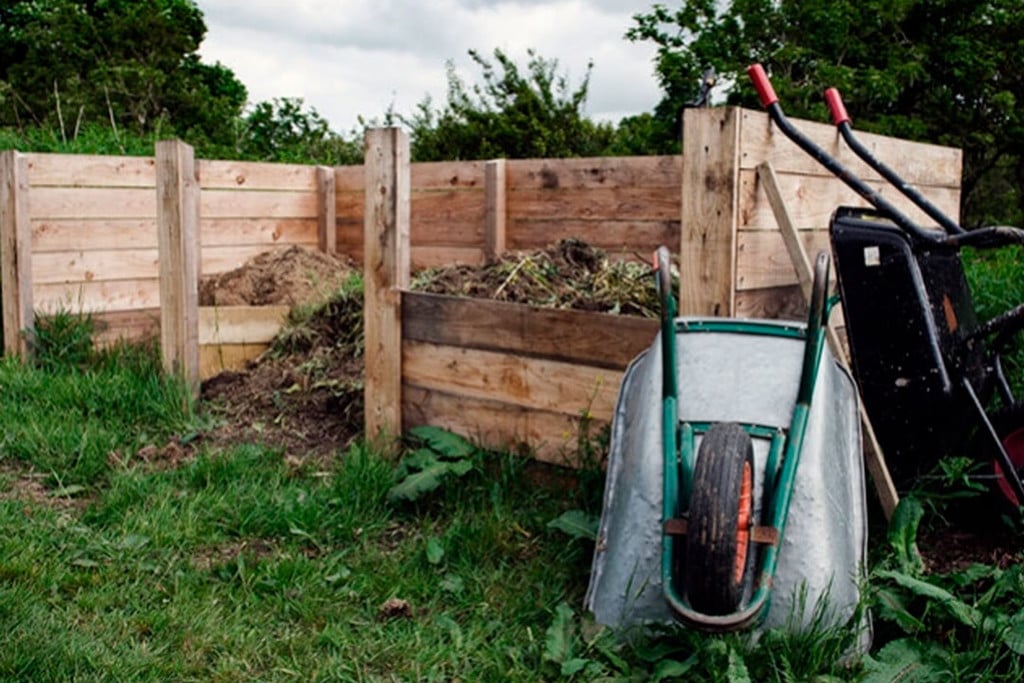.
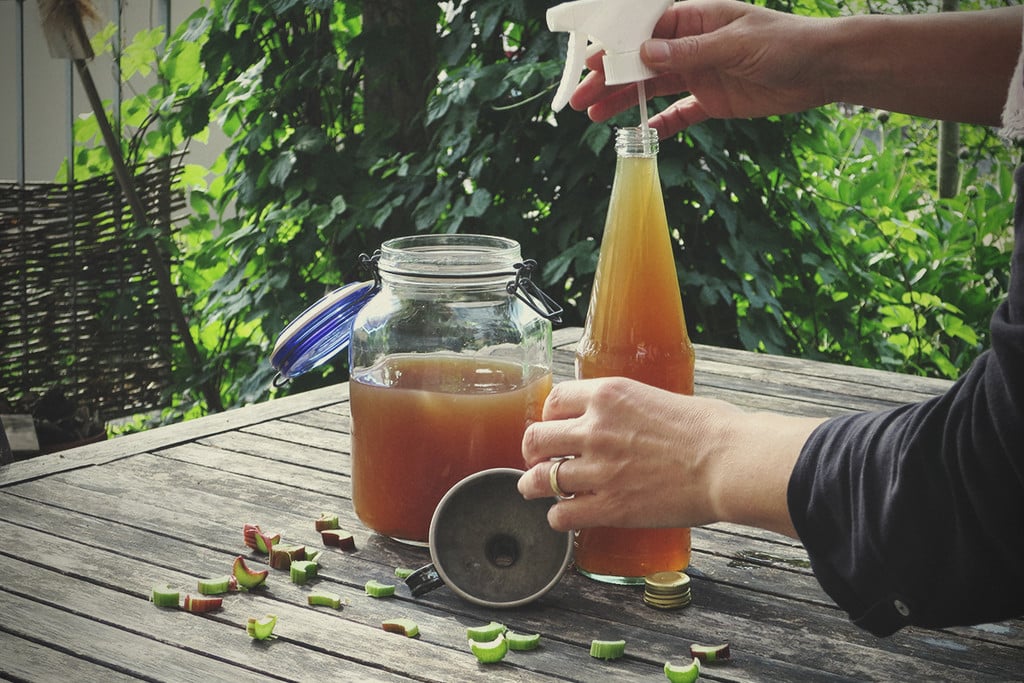
How to Use Korean Natural Farming (KNF) to Grow Cannabis
Korean Natural Farming (KNF) is a distinctive farming practice founded on sustainability. KNF promotes the growth of naturally occurring indigenous microorganisms (IMO), which forms the fundamentals of this method. Today, cannabis cultivators are beginning to adopt KNF to enhance soil and plant health, as well as yield weight and quality.
Contents:
Korean Natural Farming (KNF) is an eco-friendly agricultural technique first developed in the 1960s. The vision was to use traditional Japanese and Korean farming methods to find an alternative to harsh chemicals in agriculture.
The KNF technique has become increasingly popular among cannabis growers in recent years, as it fits in with the conscious shift away from synthetic nutrients, additives, and growing methods. Amid discussions about carbon footprint, some commercial weed growers are using KNF techniques to address the issue.
Read on to learn much more about this sustainable growing method's fundamentals and advantages.
What Is Korean Natural Farming (KNF)?
KNF is about optimising natural resources and sustainability. At its heart, KNF follows the "nutritive cycle theory", which steers the use of inputs at certain stages of growth. Practitioners of KNF can produce optimal yields in an allocated area with minimal costs—all while protecting and improving the immediate environment.
Cho Han-kyu, born in Korea in 1935, was raised on his family farm. In 1965, he went to Japan to study natural farming methods. Returning to Korea, Cho combined his new knowledge with traditional Korean farming and fermentation methods, slowly inventing the fundamentals of Korean Natural Farming. Cho opened the Natural Farming Life School and Research Farm in North Chungcheong Province in 1995.
Since then, KNF has gone global. Together with his son, Cho has held seminars in Africa, Asia, the Americas, and Europe. Up until 2014, they trained more than 18,000 people at the Janong Natural Farming Institute.
Below represents a snapshot of the effect KNF has had around the world:
| The USA | KNF gardening in Hawaii saw crop productivity increase twofold. Water use was reduced by 30%, and the need for artificial pesticides was eliminated. |
| Mongolia | The harsh weather conditions in the Gobi Desert defeated three attempts to plant trees. With KNF gardening, the trees had a 97% survival rate and, as of 2014, had reached 20 feet (~6m) in height. |
| China | The Chinese military feeds its servicemembers using its own native resources. The Beijing Olympics saw an influx of pigs being brought into the city. This caused civil unrest due to odour. KNF techniques were utilised, and the smell was successfully eliminated. |
| The USA | KNF gardening in Hawaii saw crop productivity increase twofold. Water use was reduced by 30%, and the need for artificial pesticides was eliminated. |
| Mongolia | The harsh weather conditions in the Gobi Desert defeated three attempts to plant trees. With KNF gardening, the trees had a 97% survival rate and, as of 2014, had reached 20 feet (~6m) in height. |
| China | The Chinese military feeds its servicemembers using its own native resources. The Beijing Olympics saw an influx of pigs being brought into the city. This caused civil unrest due to odour. KNF techniques were utilised, and the smell was successfully eliminated. |
-
Main Principles of Korean Natural Farming
KNF seeks to make the best use of the intrinsic potential of plants and animals by:
- Using nutrients contained within the seeds
- Using indigenous microorganisms
- Maximising genetic potential with more occasional inputs
- Avoiding synthetic fertilisers
- Avoiding tilling of farmland
- Not using livestock
Essentially, KNF involves practices that enhance bacterial and fungal life. It's about increasing diverse organic life in the soil and using raw inputs from your immediate environment.
Calcium, phosphorus, potassium, etc. can all be successfully extracted into a water-soluble solution from sources such as bones or crustacean shells. They can then be applied to your plants at critical periods when they need an extra boost.
All water used in KNF recipes is first left to stand in an open container for several days. This allows any chlorine and other volatiles to disperse. Any modifications are diluted at a ratio of 500–1000:1 for application.
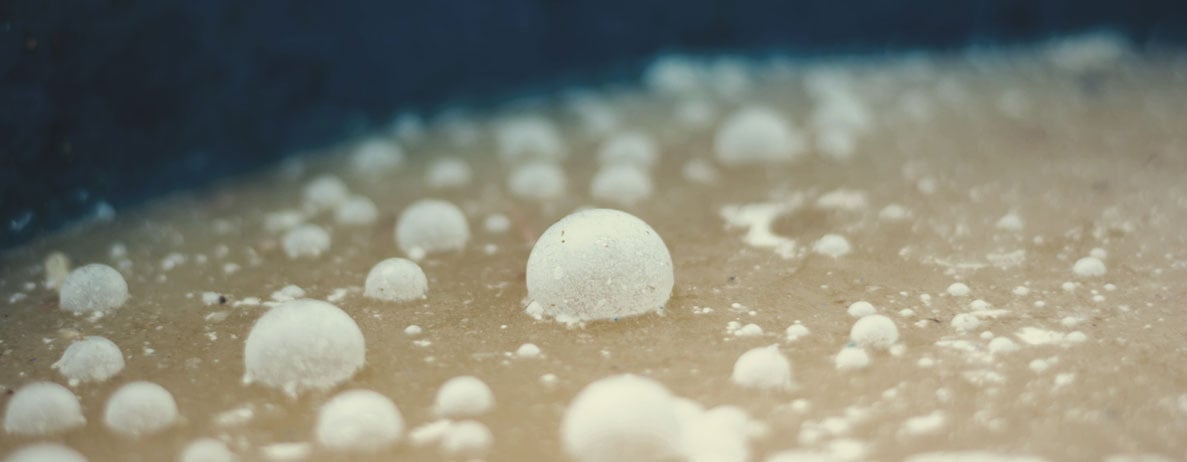

What Are the Benefits of KNF for the Cannabis Grower?
By and large, KNF can be utilised by cannabis growers to optimise the health and performance of their crops. Some of the numerous benefits of using Korean Natural Farming in your weed garden include:
- Lower costs, as no synthetic pesticides and fertiliser are required
- Less labour-intensive due to the "no-till" approach
- Crops can be stronger, healthier, tastier
- Yields can be higher (perfect environmental conditions and minor pest/disease issues mean more plants make it to harvest)
- Zero waste emission prevents transmission back into the food chain
- Soil health improves in loaminess, tilth, and structure.
- Natural inputs such as indigenous microorganisms (IMO) invigorate and rehabilitate the environment
-
Importance of IMO (Indigenous Microorganisms)
KNF uses IMO to manipulate the full potential of the ecosystem in which a crop is grown. This results in increased organic matter decomposition rates in the soil, increased nutrient availability, improved yields, reduced pathogenic microorganisms, and better plant defences.
KNF uses the following aerobic microorganisms (among others) that survive and grow in an oxygenated environment:
- Lactic acid bacteria (LAB): These improve soil ventilation and promote rapid growth. Adding lactic acid bacteria to your cannabis grow can increase trichome and terpene production.
- Purple bacteria: These bacteria thrive in oxygen-depleted water. Purple bacteria, though they can perform a similar process called anoxygenic photosynthesis, don’t use sunlight as their primary energy source, but instead use compounds like hydrogen or sulphur.
- Bacillus subtilis: Bacillus subtilis operates as a multifunctional probiotic. It has great potential for preventing the growth of pathogenic bacteria and enhancing nutrient assimilation.
- Yeast: Yeast ventilates soil, preventing it from turning anaerobic so your microorganisms can do their job. It also helps to eliminate foul odours.
- Mycorrhizal fungi: These fungi dramatically increase the size of the root system. They use enzymes to transform nutrients found in the soil into a plant-available form, which is especially crucial in maximising the quality and quantity of cannabis yields. Mycorrhizal fungi can also turn plant carbohydrates into soil amendments, "sequestering" carbon. Soil carbon accumulation is made possible by the depositing of glomalin. Glomalin mainly acts as a bridge between plant roots and mycorrhizal fungi, facilitating the exchange of nutrients and water. Soil texture, buoyancy, and water-holding capacity are affected by other factors like mineral composition, organic matter, and microbial activity in addition to glomalin. Other benefits include enhanced water uptake, increased drought resistance, pathogen resistance, and increased plant vigour.
- Nematodes: Nematodes are non-segmented worms of around 1/500 of an inch in diameter and 1/20 of an inch in length. Some nematodes are often considered harmful to agriculture and are frequent targets of pesticides. Most research suggests the ratio of beneficial to harmful nematodes varies significantly according to soil type, crop, and farming practices. However, KNF teaches that most nematodes benefit soil and plant health, and consume other parasitic nematodes.
The Cons of KNF
KNF demands care, attention, and labour. These aren't necessarily drawbacks, but KNF does require an investment of time to succeed. In KNF, the bulk of the work is learning about the inputs, and then creating them.
KNF Recipes
Korean Natural Farming maintenance formulas consists of 9 core solutions[1]. These base formulas can be used together in different dilutions to aid plants and microorganisms.
-
Microbes — Indigenous Microorganisms (IMO)
Most cannabis growers know that nitrogen, phosphorus, and potassium (NPK) are required in large quantities to ensure healthy and proper growth. KNF microbes and IMO are applied to the soil to build a fertile foundation. IMO will create inches of resilient, fertile, drought-tolerant soil in a matter of months.
Both indoor and outdoor cannabis growers could benefit massively from microbes within their soil. Soil microbes metabolise locked-up nutrients, including NPK, bound within inorganic molecules, making them more available for plants to utilise. It is reported that these microbial allies are critical drivers of plant growth within natural settings.
The recipe for IMO involves fermenting white rice and water for several days, and then adding equal amounts of brown sugar.
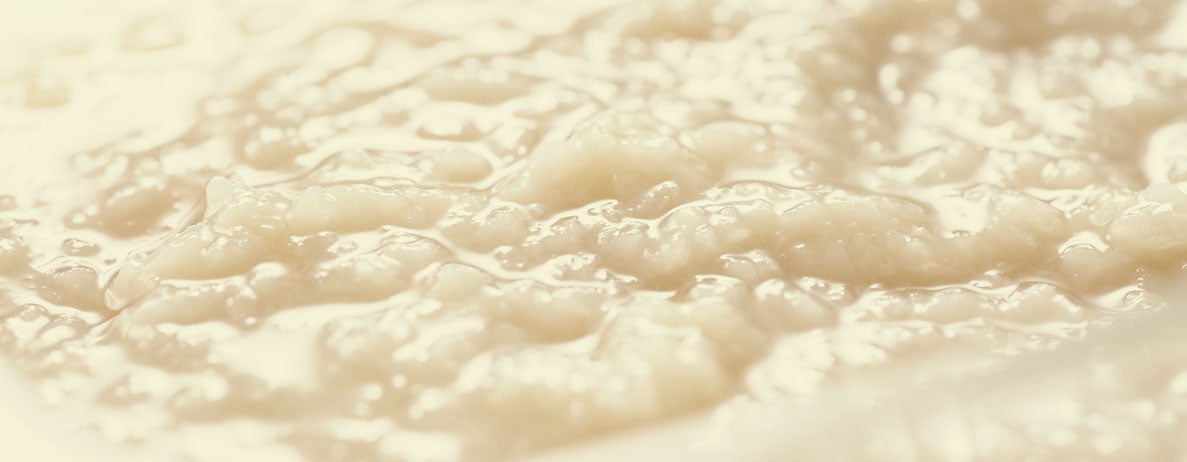

-
Police — Lactic Acid Bacteria (LAB)
KNF “police” microbes are tough. They can survive without oxygen, withstand near-boiling temperatures, and multiply faster at room temperature than almost any other microbe. LAB help to sterilise soil and remove byproducts that can build up, creating a balanced environment that can support plant life. LAB recipes involve fermenting white rice, brown sugar, and milk.
-
Minerals — Diluted Seawater (SEA)
Seawater is alkaline and contains all trace minerals, making it excellent for acidic soil. This can help in neutralising acidic soils and providing essential micronutrients to plants. It relieves tired soil, reduces compaction, and makes fruit sweeter when used in late bloom. Seawater can also be fermented with rice and mugwort to control fungal disease or added to humic and fulvic acids to make plants more drought-resistant.
-
Food — Fermented Plant Juice (FPJ)
FPJ is a liquid fertiliser made from fermenting fast-growing plants and brown sugar. FPJ contains healthy plant hormones, primary and secondary plant nutrients, lactic acid microorganisms, and yeast. The faster the plant grows, the more beneficial hormones it has. You can use FPJ for anything from soaking seeds and preparing soil to creating a foliar spray or even a general fertiliser.
-
Cleanser — Brown Rice Vinegar (BRV)
BRV facilitates vegetative growth. It helps to form the wax layer on leaves, creating resistance to diseases and insects. BRV can sterilise and restrain bacterial growth, maximise calcium's effect, and accelerate reproductive growth. BRV is made by fermenting grains or ripe fruits and water to make vinegar. You need to add a "mother" from another vinegar to speed the process up. The mother is the mix of yeast and bacteria that forms during vinegar fermentation.
-
Medicine — Oriental Herbal Nutrient (OHN)
OHN recipes are tinctures consisting of garlic, ginger, liquorice, cinnamon, and angelica. A tincture is a solution made by dissolving a substance in alcohol. These traditional herbs have been used as an effective holistic preparation for generations. OHN improves absorption of other amendments and boosts plant and soil immune systems.
-
Fuel — Fish Amino Acid (FAA)
FAA is a liquid created from fish waste that is of great value to the growth of plants and microorganisms. It contains many nutrients and amino acids that make it a good nitrogen source for plants. As such, FAA can be applied to soil and foliage to enhance growth during the vegetative period. FAA is also thought to increase the yield and improve the taste and fragrance of leafy vegetables. The recipe involves fermenting fish material with equal amounts of brown sugar.
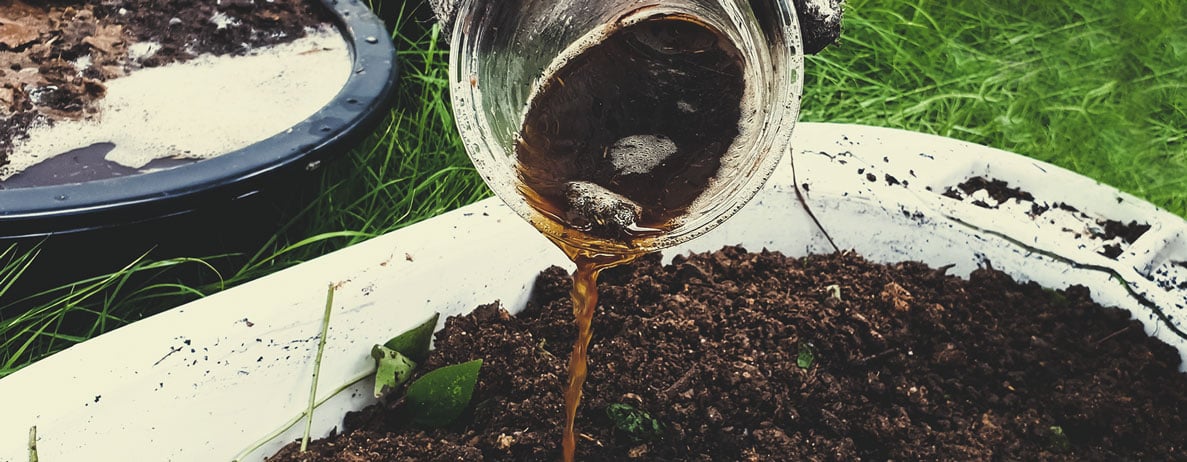
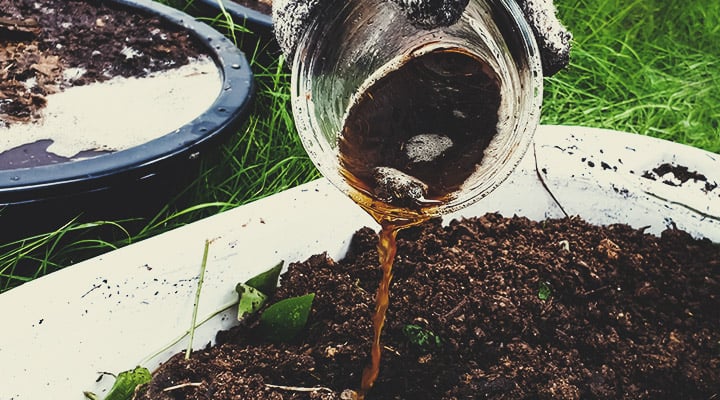
-
Structure — Water-Soluble Calcium Phosphate (WCP)
WCP is mainly produced from rock phosphate ores. Although some methods may use bones as raw material, these must be treated with specific industrial processes to ensure the safety and quality of the final product. The benefits of WCP include enhanced flowering and structural support.
-
Reproduction — Water-Soluble Calcium (WCA)
Applied as a foliar spray, WCA provides calcium to plants for normal cell processes, root growth, and fruiting. Eggshells are mixed with a weak acid, such as vinegar, and left to ferment.
Why Use KNF in Each Phase of the Cannabis Life Cycle?
The beauty of KNF is that it can be utilised to great success throughout each stage of the cannabis life cycle.
-
Seeds, Propagation, and Clones
To have your cannabis teeming with beneficial organisms from the start, you can use an IMO solution and FPJ for seed soaking and as a clone dip. Drenching the growing medium in IMO 2–3 days before putting your young plants into prop will benefit them hugely.
-
Vegetative Growth
The plant is busy growing its roots, branches, and foliage in this stage. Fish amino acids (FAA) are full of nitrogen and can fuel the explosive growth plants need. WSC sprayed on leaves will also enhance growth. LAB used in the vegetative stage can help to increase leaf size and protect against whitefly and mite infestations.
Oriental herb nutrients (OHN) can be used throughout the whole life cycle of your cannabis plant. They prevent the growth of pathogenic microbes and fight off pests and mould. They also help cannabis plants increase their resilience to environmental conditions, overall strength, and growth.
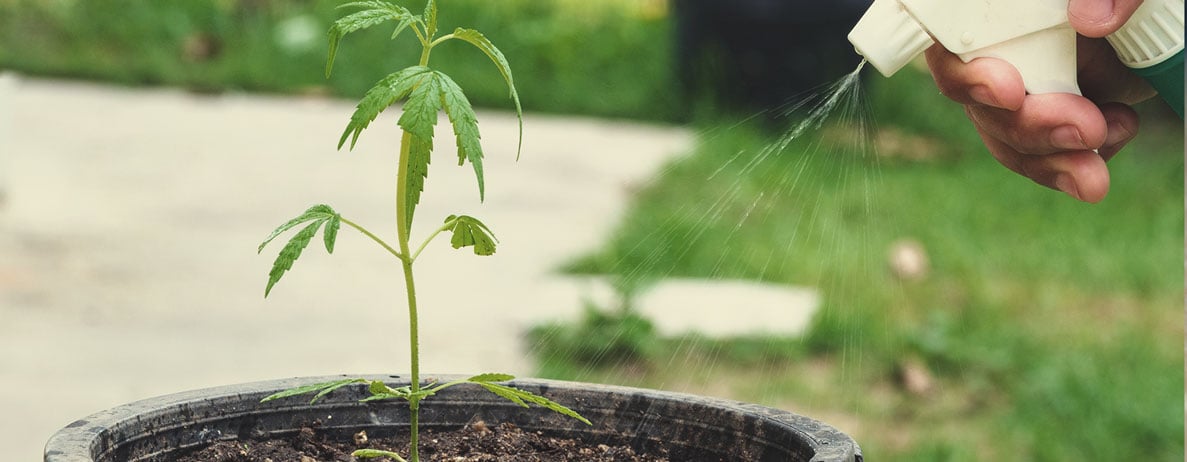
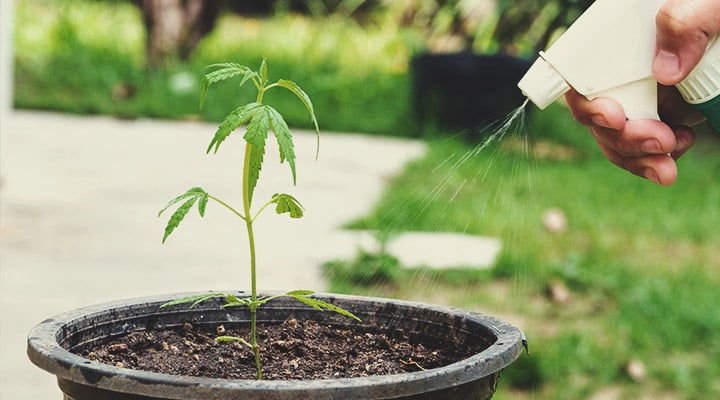
-
Flowering Stage
Once a female cannabis plant reaches adequate size, it focuses most of its energy on building those buds up, creating sticky resin and trying to attract potential pollinators. The essential nutrients required at this stage are calcium and phosphorus.
Fermented fruit juice (FFJ) contains nutrients like potassium that increase energy and promote the production of hormones used to improve yields. FFJ follows the same principles as FPJ; you just use fruits in place of fast-growing plants. Alternatively, water-soluble calcium WCA (diluted 1:1000) or a mixture of water-soluble calcium phosphate (WCP) and WCA can help the plant compile nutrients in its buds to improve fruit quality.
How to Use KNF Inputs
As mentioned throughout this article, KNF can be applied in several ways, including as a soil amendment, foliar spray, and more.
-
Soil Enrichment
Microbes and IMO can be modestly distributed in soil and covered with mulch to retain a dark and moist environment (to encourage further IMO development). Microbes should be applied before planting, around 2–3 hours before sunset/lights off, and a few hours after mixing. For more unproductive soils, use 14 days before planting to get the soil teeming.
You can look at soil enrichment practices such as recycled organic living soil (ROLS). ROLS is essentially any soil system that uses organic and sustainable practices to return nutrients and vitality to the soil.
LAB can also be added to soil, and should be diluted at a rate of 5,000–10000:1. This helps to solubilise phosphate in the earth and encourage phosphate decomposition.
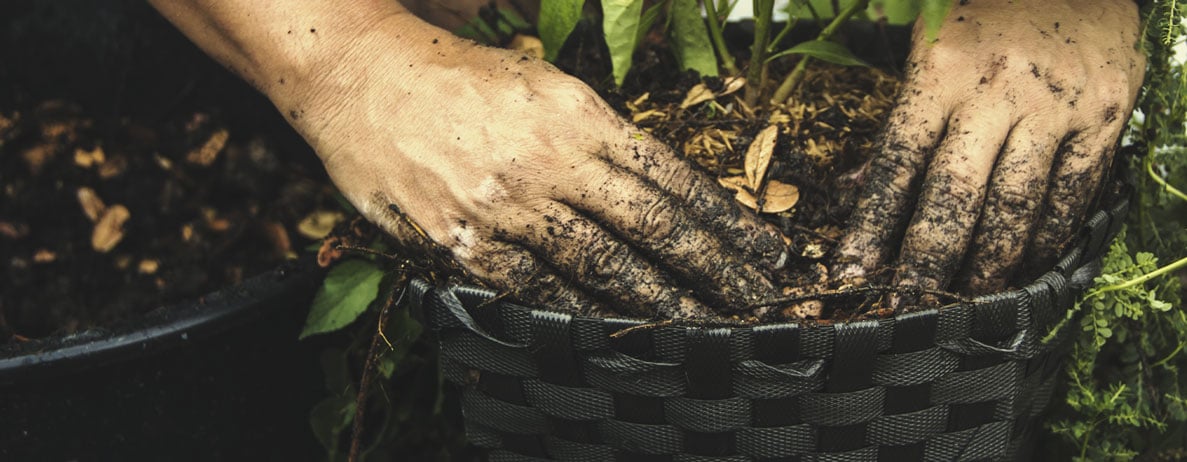
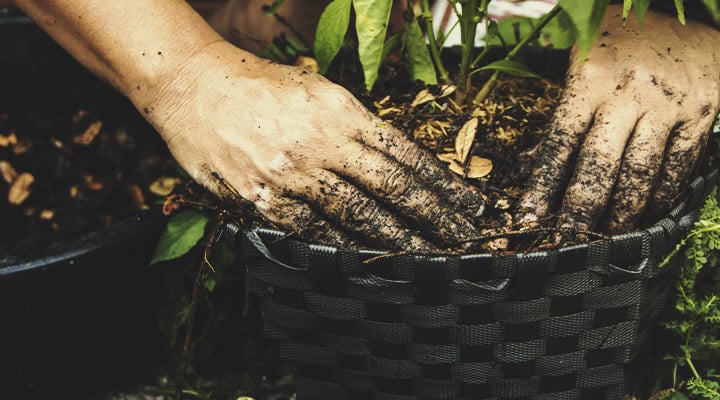
-
FMC Fertiliser
Fermented mixed compost (FMC) is created using KNF techniques and generic compost materials. It makes compost IMO-rich and full of soluble nutrients. A shaded, naturally sheltered location featuring good drainage on an earthen floor provides the best environment for its creation.
FMC should be applied 2–3 hours before sunset/lights off and covered with more medium or mulch. Alternatively, you can make a liquid fertiliser by placing FMC in a cloth bag and submerging it in water with other KNF inputs.
-
Foliar Feeding
Other KNF inputs are applied directly via foliar feeding to crops, including cannabis, at different stages of their development. Foliar feeding delivers the required elements to the plant by gently misting the leaves, resulting in a fast uptake of elements. Foliar feeding with KNF inputs is also a great, non-toxic way to repel pests.
KNF and No-Till Farming
No-till practices and and KNF go hand in hand to help you get the best out of your crops. No-till allows the soil structure to stay intact, and improved soil structure means increased water retention. This reduces soil erosion and runoff, preventing pollution from entering nearby water sources. When soil is left undisturbed, beneficial soil organisms can establish themselves and feed off any organic matter in the ground.
Some say that the terpene profiles of cannabis plants grown in no-till living soil are the best. Resin production is increased, and trichomes will be more densely packed.
A healthy soil biome is essential for nutrient cycling and preventing plant diseases. As organic matter in the soil improves, so does the internal structure, which increases the soil's capability to grow more nutrient-dense crops.
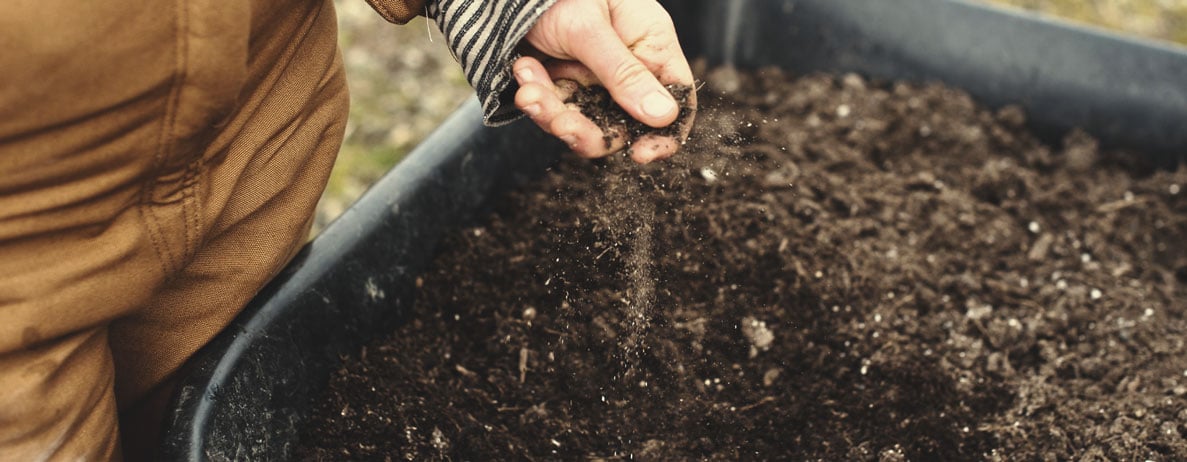
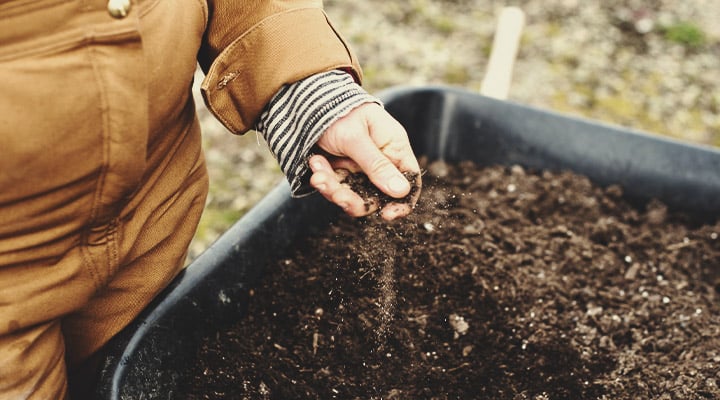
KNF vs Bokashi
Bokashi comes from a Japanese word meaning "fermented organic matter". Bokashi is used as compost or compost tea. With bokashi, anaerobic fermentation is used to produce fertiliser. In anaerobic fermentation, the microbes work without the need for oxygen. Bokashi can then be fed directly to the soil without requiring additional time to mature like regular compost.
Kitchen scraps, including meat and dairy products, are mixed with molasses and some bokashi "host" medium. The host medium can be any fine organic grain or grass-like substance. This includes bran, rice, used mushroom growth medium, dried leaves, or even sawdust. The food scraps are pressed into the bokashi bucket, covered with a handful of the host material, and covered for 10–12 days. When the bucket is opened, the contents are ready to be used.
Korean Natural Farming, however, follows a more traditional approach, using aerobic fermentation to produce organic fertilisers. Apart from brown sugar, KNF uses locally sourced ingredients for its inputs. KNF steers away from using molasses or animal waste, instead using simple extracts of minerals, nutrients, hormones, and microorganisms to improve soil health, plant health, and nutrition. KNF is essentially DIY affordable medicine for soil and plants. Sometimes, it can even be helpful for animals and humans too.
The Ethos of KNF Applied to Marijuana
Korean Natural Farming is a step further toward living in harmony with our surroundings. It is fantastic that these thousands-of-years-old farming techniques are coming to the mainstream and helping everyone from hobbyist growers to big commercial farmers understand their place in the ecosystem. Given that the cannabis industry is booming, and thus taking more of a toll on the environment and its resources, it’s important to consider less-harmful or wasteful methods of cultivation.
This is in no way an exhaustive list of all there is to know about KNF. It is, however, a starting point to understanding the fundamental concepts of how it can be applied to cannabis cultivation. KNF is an enriching process that makes you look at nature entirely differently. The addition of KNF inputs into your cannabis garden, whether indoors or outdoors, will, without a doubt, bring a higher level of quality to your plants, and your grow-op as a whole.
- KNF Recipes: How-to Make Solutions https://naturalfarminghawaii.net


























